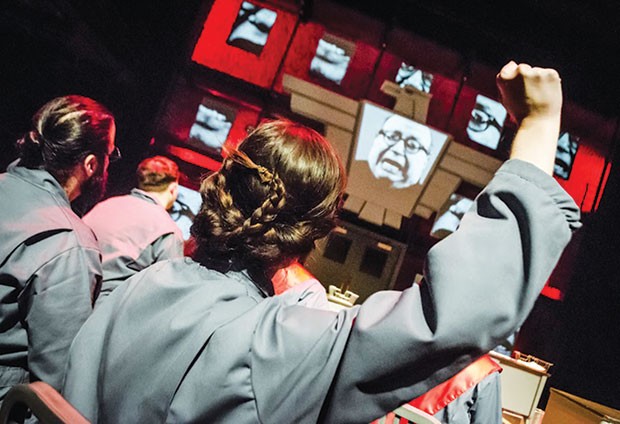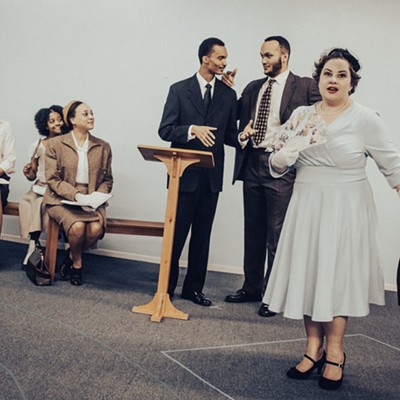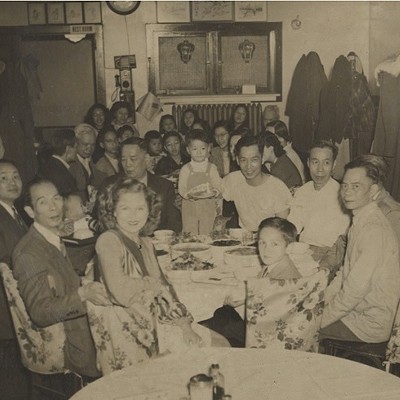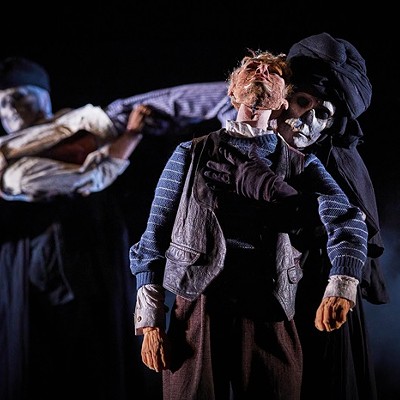1984 at Prime Stage Theatre
Richard Keitel directs an adaptation of George Orwell’s 1949 dystopian novel

A scene from 1984, at Prime Stage Theatre.
1984
continues through Sun., March 12. Prime Stage Theatre at the New Hazlett Theater, 6 Allegheny Square East, North Side. $10-25. 724-773-0700 or primestage.com
Have you ever had a negative thought about the ruling party of government? 1984, adapted from George Orwell’s classic dystopian novel, and now at Prime Stage Theatre directed by Richard Keitel, portrays a society in which individualism and free thought are punishable by law.
Orwell’s novel was published in 1984. Sixty-eight years later, that world of government surveillance and jingoism remains a history lesson and a foreboding warning all at once. A large, austere bird is perched on the back wall of the New Hazlett stage. It feels reminiscent of Nazi symbolism and is also the “telescreen” that Big Brother is always watching from. The characters in pra live in constant fear.
At work, in the Ministry of Truth, Winston Smith (Justin Fortunato) participates in micro-rebellions like pouring his cup of “victory coffee” into the trash. He must hold his personal longing for a free world at bay, fearing that one of his coworkers will turn him in to the “Thought Police.” The adaptation by Robert Owens, Wilton E. Hall Jr. and William A. Miles introduces the audience to the “Newspeak” language; it’s a way of speaking developed to censor thought, but through it, the richer nuances of the society get lost and condensed.
A new employee, Julia (Jessie Wray Goodman), fills the vacancy of a missing coworker and she begins a risky new relationship with Smith. The chemistry between Goodman and Fortunato takes time to emerge. They’re viewed as adulterers, but their love and desire for individuality is so palpable they’ll stop at nothing to get married behind Big Brother’s back. Their passion goes from periods of feeling contrived to moments of wistful naivety. They find temporary sanctuary in a small apartment owned by a prole, or member of the uneducated working class. Tracey D. Turner plays the landlady with an earthy soul, still deeply connected to her past in the free world.
Scenes are slow to find their pace, but the third act is a graphic and compelling highlight. Throughout, director Keitel allows Big Brother to address the characters from the telescreen. Like Big Brother, the audience is also always watching these characters, but when it’s most needed, they don’t fully manifest the terror of living under a microscope.
Orwell’s novel was published in 1984. Sixty-eight years later, that world of government surveillance and jingoism remains a history lesson and a foreboding warning all at once. A large, austere bird is perched on the back wall of the New Hazlett stage. It feels reminiscent of Nazi symbolism and is also the “telescreen” that Big Brother is always watching from. The characters in pra live in constant fear.
At work, in the Ministry of Truth, Winston Smith (Justin Fortunato) participates in micro-rebellions like pouring his cup of “victory coffee” into the trash. He must hold his personal longing for a free world at bay, fearing that one of his coworkers will turn him in to the “Thought Police.” The adaptation by Robert Owens, Wilton E. Hall Jr. and William A. Miles introduces the audience to the “Newspeak” language; it’s a way of speaking developed to censor thought, but through it, the richer nuances of the society get lost and condensed.
A new employee, Julia (Jessie Wray Goodman), fills the vacancy of a missing coworker and she begins a risky new relationship with Smith. The chemistry between Goodman and Fortunato takes time to emerge. They’re viewed as adulterers, but their love and desire for individuality is so palpable they’ll stop at nothing to get married behind Big Brother’s back. Their passion goes from periods of feeling contrived to moments of wistful naivety. They find temporary sanctuary in a small apartment owned by a prole, or member of the uneducated working class. Tracey D. Turner plays the landlady with an earthy soul, still deeply connected to her past in the free world.
Scenes are slow to find their pace, but the third act is a graphic and compelling highlight. Throughout, director Keitel allows Big Brother to address the characters from the telescreen. Like Big Brother, the audience is also always watching these characters, but when it’s most needed, they don’t fully manifest the terror of living under a microscope.

















